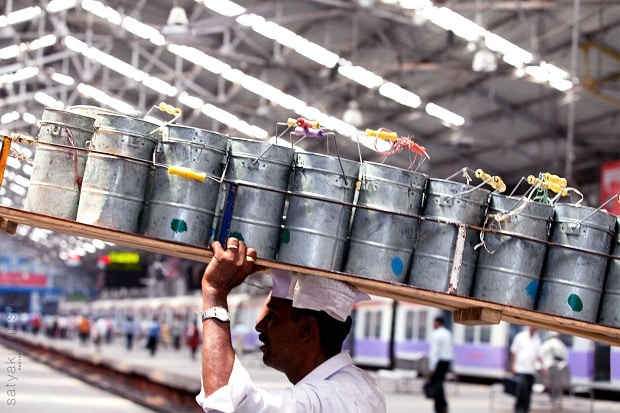Mumbai is one of the largest cities in the world and an average working professional leaves home pretty early in the day to take the local train to commute to the work. Each day approximately 4,000 dabbawallahs deliver almost 250,000 home-cooked meals (for late breakfast and lunch) from the kitchens of suburban wives and mothers direct to workers in “the world’s most ingenious meal distribution system.”
The foot soldiers are Dabbawallahs, who pick up the home-cooked lunches in the suburbs, hop on trains, and deliver them, on foot or bike, to office workers in Mumbai. Later on, they pick up and bring back the same empty tiffins (the name for the metal containers used).
The tiffins consist of several stacked aluminum boxes with a carry-handle. Each container carries individual portions that separate curry dishes, bread, rice, desserts, and more. This means multiple courses. Tiffins come in several different compartments so as to separate starter, mains, and dessert. The tiffin serves to keep food in its original shape - no bruised fruit or mashed roti. The tiffin’s handle is at the top, keeping everything upright when being carried. Home-cooked meals are economical and can be more healthy.
While the system seems very complicated, it is the coming together of many elements, including the railway system in Mumbai. The dabbawallah rely on the train to deliver the lunch boxes around the city. Stefan Thomke, the Harvard Business School professor studied the system: “[the railway] sort of helps them in unexpected ways. It synchronizes the system because in Mumbai the railway is one of the few things that always runs on time. It forces the entire organization to run according to a rhythm.”
Another example of how simplicity aids the dabbawallah system is the labeling of the tiffins. There’s very little information coded on the boxes. “For example, there’s no return address,” says Thomke, “but these boxes have to go back to the person who gave them to you.” The simple color coding system acts as an identification system for the destination and recipient and origin of the tiffin.
The Dabbawala Association has been in business for over last 125 years. In 1998, Forbes Magazine recognized its reliability to match the Six Sigma standard. This means that the dabbawalas make less than 1 mistake in every 6 million deliveries. Be it a Steve Jobs or Picasso, all the great artists always had a penchant for simplicity. Value and efficiency is maintained by keeping to basics. The process is very lean and uncomplicated. And the customer is the most important cog in this machine.
Read more here

No comments:
Post a Comment